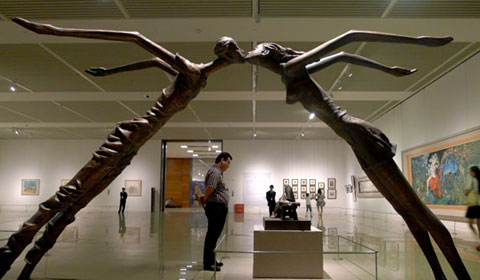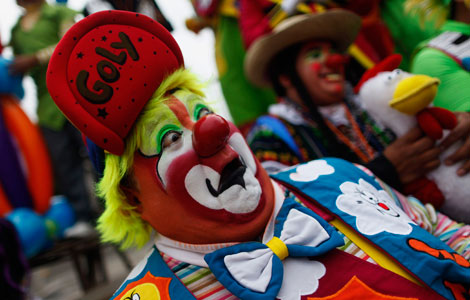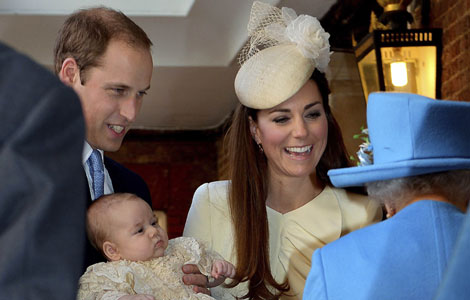Joy all over the border
Updated: 2013-10-25 15:53
By Hu Yongqi and Li Chuchu in Ruili, Yunnan (chinadaily.com.cn)
|
||||||||
Baobo carnival plays a key role in connecting Dai community, boosting China's ties with Myanmar
Good weather, good crowds and exotic events combined to make an annual event in Ruili, earlier this month, an important event in China's efforts to bolster ties with its Asian neighbors.
Though the 13th China-Myanmar Baobo Carnival in Ruili, a county-level city in Dehong Dai and Jingpo autonomous prefecture in Yunnan had friendship as its main theme, it also fostered several important business and interpersonal relations between China and Myanmar.
But the real benefit of Baobo, meaning brotherhood and relatives in the Dai ethnic language, over the years has been the key role that it has played in preserving and fostering Dai ethnic traditions and culture, several of which have been facing extinction threats. It has also helped preserve peace and instill trust and confidence in the 169-kilometer border between China and Myanmar.
"The Baobo carnival is an important event that showcases the diverse ethnic culture of the Dai community. It has promoted friendship and mutual development between China and Myanmar," says Gong Jingzheng, head of the Dehong prefecture.
Members of the Dai community, however, see it as an important event that bridges their present with the past and also boosts cooperation with Myanmar in tourism and border trade.
The huge crowds that thronged the streets in Ruili to watch the impressive parade and cheer the maidens on carts decorated with orange flowers and banana leaves further drove home the importance that these events have in connecting communities in border regions.
Traditional handicrafts, bamboo weaving, peacock dances, sepak takraw games and exotic food from Myanmar were in the limelight at this year's fair.
Ethnic handicraft handed down the generations was the cynosure of all eyes, especially for overseas visitors. Though there are no actual numbers as of yet, the Pan-Asia Fair that was held during the event is believed to have set the turnstiles ringing for several Dai artisans
Shao Meihan, one of the artisans and an exponent of the ancient Dai paper-cutting craft, says she was surprised by the undue attention this year. Shao, who learnt the craft from her grandmother when she was young, says the ancient craft was used mostly for sacrificial ceremonies such as funerals.
"When I started learning the craft, my desire was to extend the craft to more shapes and patterns and for more occasions. But, I also learned that it was important to preserve the ethnicity so that the Dai culture spreads to more people," Shao says.
Local artisans like Shao say that the Ruili fairs have prompted several young members of the Dai community to pick up the dying art form again. "It is like a new lease of life for an ancient craft that is dying," Shao says pointing to the large number of people waiting for classes at her makeshift stall.
"Paper-cutting is an important way of narrating our heritage and preserving our culture. It is something that the Dai youngsters should preserve," says Yao Jingyu, a 33-year-old mother who has brought her child for a training session at the fair.
At the Pan-Asia Jewelry Fair held in Mangshi, the capital of the Dehong Dai and Jingpo autonomous prefecture, prior to the main fair, local artisans saw keen buying interest for traditional handicrafts and jewelry.
Bamboo weaving, another traditional Dai handicraft also drew in the crowds during the fair. In the Dai culture, bamboo weaving is a skill that is passed down through the ages. It is not uncommon to see beautiful specimens of bamboo weaving like furniture, love tokens and even essential items in Dai hamlets.
Baluo, a small bamboo pocket Dai women always carry on their waist, is an ornament that is a part of Dai traditional costume and also a love symbol presented by male suitors. Experienced craftsmen can turn out a Baluo after less than an hour of work, experts say. The Dai brocade, another intangible cultural heritage, that dates back to the Tang Dynasty (618-907 AD) is another awe-inspiring attraction with its rich tapestries and vivid colors.
Meals and local snacks are crucial means of grassroots communication in daily lives. So it was no surprise that food was an important attraction at the carnival.
"Bread comes first' is a common epithet used to describe the Dai community's love for ethnic food. Dai homemade rice wine, barbecued meat, Achang rice noodles and Myanmar beer were in demand.
"I came to Ruili with my family when I was 12. I have now moved my family to Ruili since my small business is getting better and better," says Chapatti, a 45-year-old food provider from Myanmar. Ethnic sports like Sepak takraw, a soccer-like game also kept the crowds engrossed.
"The carnival showcases different ethnic cultures and provides excellent Myanmar food. There is so much that I want to do at these fairs," says Yang Xiaodong, a tourist from Kunming, the capital of Yunnan province.
The beauty contest and ethnic parades showcased a variety of ethnic customs such as cloth, dance, musical and other performances. The colorful flotilla of ethnic costumes paraded by young ladies was another eye-catcher.
The peacock dance was undoubtedly the crown jewel of the carnival. It is said ‘you can sing if you can talk; you can dance if you can walk' in Dehong. Peacock is a spirit bird symbolizing felicity and auspiciousness for the Dai people who have imitated actions of peacocks to adapt it as a dance form, experts say.
"This is my first visit to China. The carnival is attractive and lively. I will attend to the carnival next year as well," says Kyaw Kyaw, a visitor from Myanmar.
"In ancient times, the carts were an important means of transportation. However, as time went by, the cart faded out from people's life," said an official statement during the opening ceremony.
"The cultural parade is not only a stage to show ethnic culture and harmonious relations between China and Myanmar, but also a chance to strengthen the friendship between the two sides," it said.
"We want to maintain Baobo as an important cultural event that enlarges and encourages interaction between the two countries," Gong says.
Li Yingqing and Guo Anfei contributed to this story.

 Giant duck to exit after drawing the crowds
Giant duck to exit after drawing the crowds
 Miss Universe 2013 to be held in Moscow
Miss Universe 2013 to be held in Moscow
 Ministry to begin inspecting most heavily polluted regions
Ministry to begin inspecting most heavily polluted regions
 Spy claims stir rebuke to Obama
Spy claims stir rebuke to Obama
 Paint the world a picture
Paint the world a picture
 World's first 1-liter car debuts in Beijing
World's first 1-liter car debuts in Beijing
 Latin American clown convention
Latin American clown convention
 Prince George baptized in London
Prince George baptized in London
Most Viewed
Editor's Picks

|

|

|

|

|

|
Today's Top News
US, China broadband companies join forces
Chinatown restaurants learn how to get an 'A'
Snuff bottle 'gems' on display at Met
Beijing airport set to become world's busiest
US firms urge easier process for investment
Wal-Mart plans to open 110 new stores
Spy claims stir rebuke to Obama
China calls for strengthened EU ties
US Weekly

|

|







